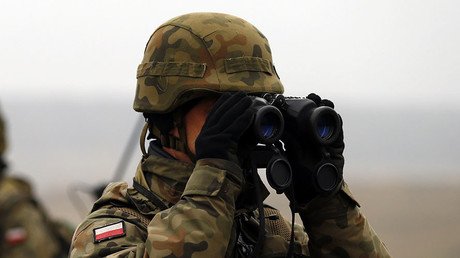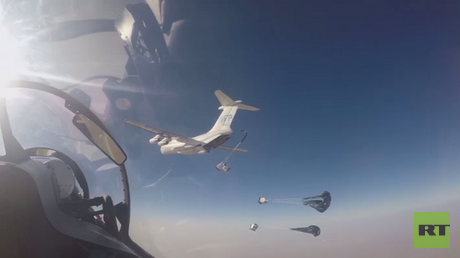Disunity, pursuit of selfish interests hinders war on terror – Russian dep. defense minister
Political ambitions and selfish national interests of some countries are the main stumbling block to defeating terrorism, Russian Deputy Defense Minister Anatoly Antonov told RT ahead of the 5th Moscow Conference on International Security.
The high-profile forum, which will focus on the fight against global terrorism, will see about 500 guests from at least 80 countries arriving in Moscow, which will host the upcoming conference on April 27-28.
Speaking about the obstacles in the way of international efforts to defeat various armed terror groups, Antonov pointed to the lack of unity in the face of the global threat.
“What stands in the way today is political ambitions and selfish national interests of certain countries, who realize full well that they can’t fight terrorism on their own,” Antonov said, emphasizing that no one can escape the consequences of the rapid spread of terror in the modern interconnected world.
“No one can feel safe today; nobody is living on an island. No one can hide from terrorists behind an ocean,” Antonov added. He pointed at the network nature of the terror groups that set up their cells all over the world, including in the Asia-Pacific and Central Asia where they are already “trying to get a foothold.”
The only viable solution to the spread of terrorism is a common global approach, he said.
“The international community has to come together and join forces in fighting this evil,” said Antonov, adding that terrorism will top the agenda of sessions on the Middle East, Europe, Asia Pacific and Central Asia, as the recent attacks in Europe showed that terrorism does not recognize state borders.
“We firmly believe that our only option is to join forces. This is what we did back in the days of World War II,” said Antonov, referring to Russian President Vladimir Putin’s call for the international community to create broad anti-terror coalition “similar to the anti-Hitler coalition” that will counter the terror threat with Muslim countries being the key in its success.
‘No more fighting, it’s time to build a new Syria’
The withdrawal of the majority of Russian air forces from Syria marked a successful end of Russia’s major, six-month involvement into the Syrian crisis that galvanized the process of the country’s liberation from Islamic State (IS, ISIS/ISIL) and other terrorist groups, such as Jabhat-Al-Nusra.
With the implementation of the cessation of hostilities and more opposition groups joining President Bashar Assad’s armed forces in battling ISIS on the ground, the Syrian army became strong enough to liberate the historic city of Palmyra with the support of Russian air strikes.
‘Anachronism with no military or mission’: #NATO foundations crumbled – Stratfor founder https://t.co/i8fAiIvpzFpic.twitter.com/zvn47wNNRS
— RT (@RT_com) 18 апреля 2016 г.
“I believe the liberation of Palmyra was a turning point in the entire Syrian campaign,” Antonov told RT, while admitting that, although, the bulk of Russian air forces had now left the embattled country, Russia hasn’t accomplished its mission in Syria and will concentrate on “restoring its day-to-day operations.”
This includes meeting the basic needs of Syria’s civilian population who dream of returning to a normal life while experiencing the shortage of such essentials as bread. In recent weeks Russia has shipped more than 700 tons of humanitarian cargo to Syria, Antonov said. Demining Palmyra also remains high on Russia’s priorities in Syria.
“So we are doing everything in our capacity to make life easier for civilians in Syria, so that everybody would be able to come round, take a deep breath and get a feel of the ceasefire, and benefit from it firsthand,” he said, outlining Russia’s new strategy in the country as “no more fighting, it’s time to build a new Syria.”
Russia & US should work together ‘much more than today’
Speaking about the strained relations between the US and Russia, Antonov underlined the positive outcome of the cooperation with the US in the fight against terrorists in Syria.
“We have worked out a positive, efficient relationship with the US while combatting terrorism in Syria… we are constantly in touch with the US military. There is coordination and collaboration,” he said, however, admitting that there’s still room for improvement.
While expressing Russia’s willingness to engage in closer cooperation in fighting terror, Antonov said that both sides should be ready to take a step further. “Now it’s all up to Washington,” he added.
As to NATO’s decision to suspend cooperation with Russia and concerns voiced by NATO leaders that Russia is “at the doorstep of the Alliance,” Antonov believes such moves are a part of a blunt propaganda campaign.
“Russia is being targeted by a propaganda campaign. Some of the statements made by NATO leaders are nothing short of absurd. They are now saying that Russia is ‘at the doorstep’ of the Alliance, as if it has been Russia expanding its territory toward the Alliance all these years, and not vice versa,” said Antonov, blaming NATO officials for employing the “same old master-and-apprentice” approach toward Russia.
Russia will not tolerate any attempt to dictate to it how to act and will retaliate against any military advances of NATO member states close to Russia’s borders, such as the stationing of a missile defense system “with regard to our own military and technical capabilities,” Antonov said.
However, Russia will not be dragged into an arms race, he insisted.
“But I would like to emphasize that we are against getting into an arms race, no matter who is trying to impose one on us,” said Antonov, adding that restoring military cooperation with NATO is only possible on the principles of “equality, dialogue, mutual respect and acknowledgement of each other’s interests.”
Three deputy prime ministers, some 20 defense ministers and 15 chiefs of staff are expected to come to the 5th Moscow Conference on International Security, as well as 10 representatives of international organizations, two deputy secretaries-general of the UN, delegates from OSCE, CIS, the Arab League, CSTO and the International Committee of Red Cross, who are also set to join the discussions to be held on April 26-27.
The event is expected to attract extensive media coverage, with more than three hundred journalists accredited for the conference.














